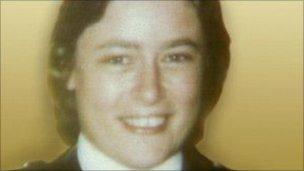PC Yvonne Fletcher killing: Mother's new hope
- Published

Libyan embassy staff claimed diplomatic immunity after PC Yvonne Fletcher was killed
The mother of murdered policewoman PC Yvonne Fletcher has said the upheaval in Libya represents the "best chance" to find her daughter's killer.
PC Fletcher, 25, died in April 1984 after shots were fired from the Libyan Embassy in London at a protest outside.
Her mother, Queenie, said she hoped somebody could be brought to justice.
Her comments come after International Development Secretary Andrew Mitchell said it was an issue the UK government would want to pursue.
'Judicial process'
Mrs Fletcher said: "This is the best chance to find my daughter's killer. Even after all these years, I very much hope that somebody is brought to justice.
"I shall be very pleased if there is a new judicial process which can find my daughter's killer."
Mrs Fletcher told BBC London reporter Anjana Gadgil that she hoped something could be done but all she could do was wait and see as events unfolded.
Paul McKeever, chairman of the Police Federation, which represents rank-and-file officers in England and Wales, echoed Mrs Fletcher's view.
He said: "I think this is the best opportunity over the past 25 years to bring the killers to justice. I would expect the Home Office and the Foreign Office to be working towards that end."
PC Fletcher had been policing a small demonstration outside the Libyan People's Bureau in St James's Square against the regime of Col Muammar Gaddafi.
Memorial created
She was one of 30 unarmed police officers when shots were fired from the first floor of the diplomatic mission.
An 11-day siege ensued but suspects from inside the embassy left the UK after claiming diplomatic immunity and no-one was ever charged.
A memorial was erected at the spot where PC Fletcher was fatally wounded.
Mr Mitchell told the BBC he believed the downfall of Col Gaddafi could lead to the gunman being brought to justice.
He said: "That was an outrageous crime committed on British streets for which no-one has yet been held accountable.
"There is no question whatsoever that, following a free Libya under the transitional control of the NTC (National Transitional Council), that is an issue that the British government will wish to pursue with the new Libyan authorities.
"I am reasonably confident that a judicial process designed to bring that heinous crime to court would indeed take place."
- Published24 August 2011
- Published25 March 2011